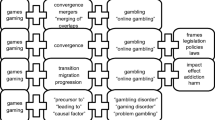
Overview
- Seeks to situate the development of social media games alongside broader social, political, and technological changes
- Looks at the gamification and ‘gamblification’ of everyday practice
- Considers gambling in different international contexts including the UK, USA, and Australia
- This is an open access book
Part of the book series: Leisure Studies in a Global Era (LSGE)
Buy print copy
Tax calculation will be finalised at checkout
About this book
This open access book focuses on how and why digital games and gambling are increasingly intertwined and asks “does this matter?” Looking at how “loot boxes” became the poster child for the convergence of gambling and gaming, Wardle traces how we got here. She argues that the intersection between gambling and gaming cultures has a long lineage, one that can be traced back throughout the 20th century but also incorporates more recent trends like the poker boom of the 1990s, the development of social media gambling products and the development of skin betting markets.
Underpinned by changing technology, which facilitated new ways to bet, trade and play, the intersection between gaming and gambling cultures and products has accelerated within the last decade – and shows little signs of stopping. Wardle explores what this means for our understanding of risk, how gaming and gambling entities use each other for commercial advantage, and crucially explores what young people think of this, before making recommendations for action.
Similar content being viewed by others
Keywords
Table of contents (5 chapters)
Reviews
Authors and Affiliations
About the author
Heather Wardle is Lord Kelvin/Adam Smith Reader in Social Sciences at the University of Glasgow, specialising in gambling research, policy and practice.
Bibliographic Information
Book Title: Games Without Frontiers?
Book Subtitle: Socio-historical Perspectives at the Gaming/Gambling Intersection
Authors: Heather Wardle
Series Title: Leisure Studies in a Global Era
DOI: https://doi.org/10.1007/978-3-030-74910-1
Publisher: Palgrave Macmillan Cham
eBook Packages: Social Sciences, Social Sciences (R0)
Copyright Information: The Editor(s) (if applicable) and The Author(s) 2021
Hardcover ISBN: 978-3-030-74909-5Published: 17 July 2021
eBook ISBN: 978-3-030-74910-1Published: 16 July 2021
Series ISSN: 2946-3173
Series E-ISSN: 2946-3181
Edition Number: 1
Number of Pages: XIII, 111
Topics: Sociology, general, Popular Culture , Media and Communication, Sociology of Sport and Leisure, Sport Science , Media Sociology



